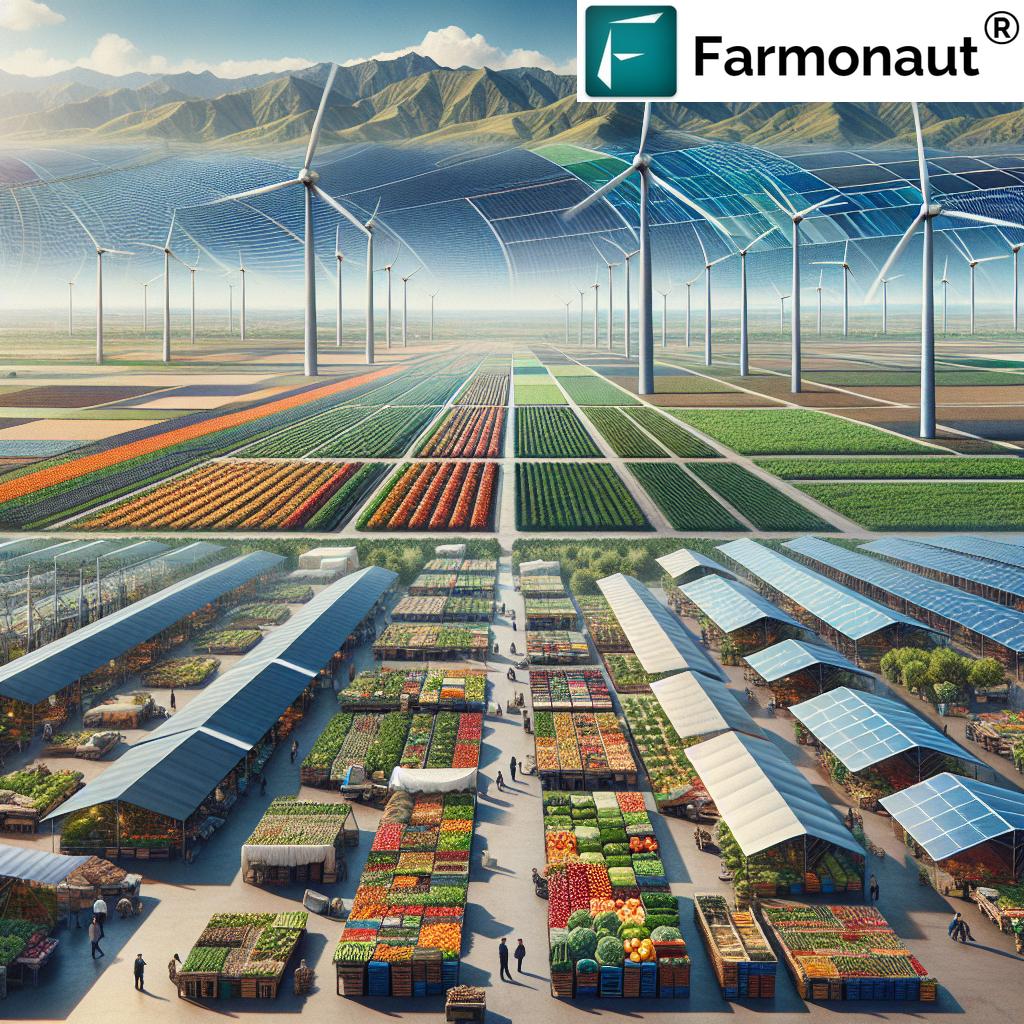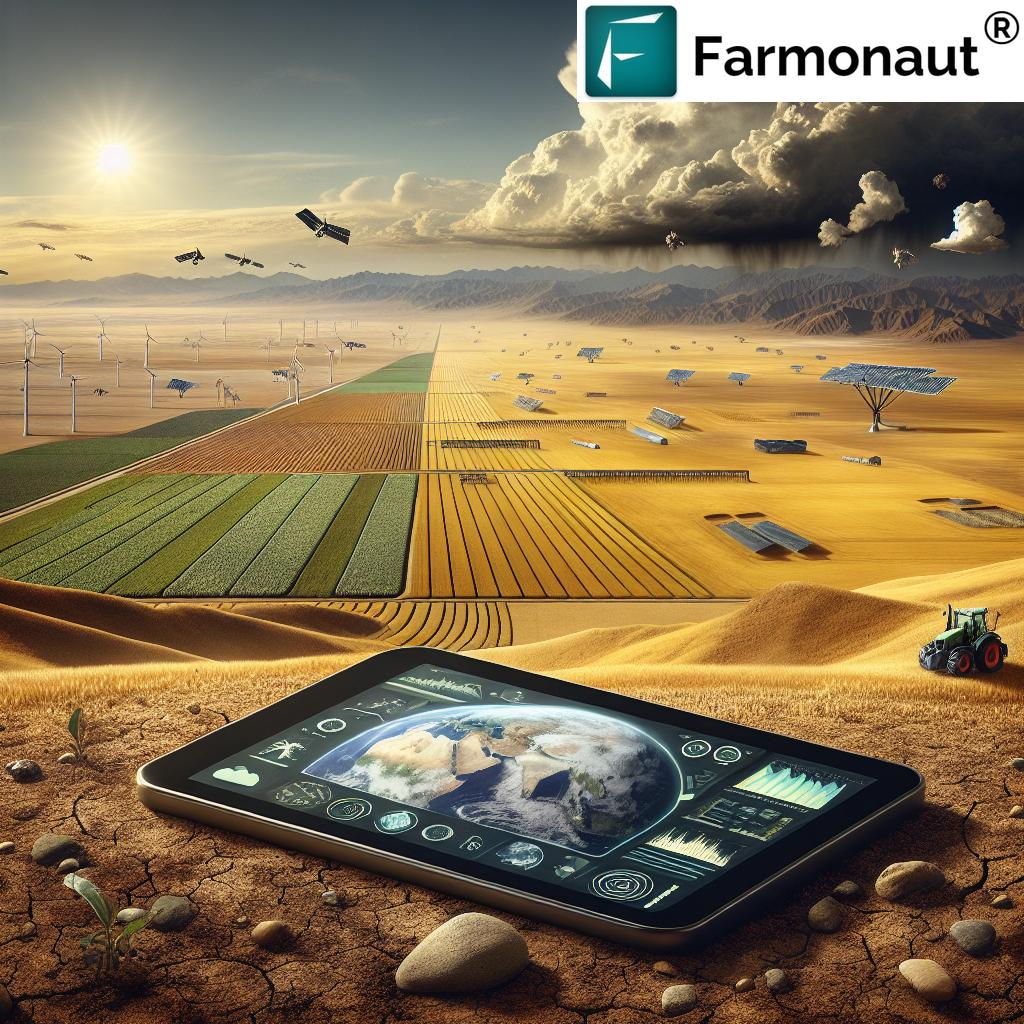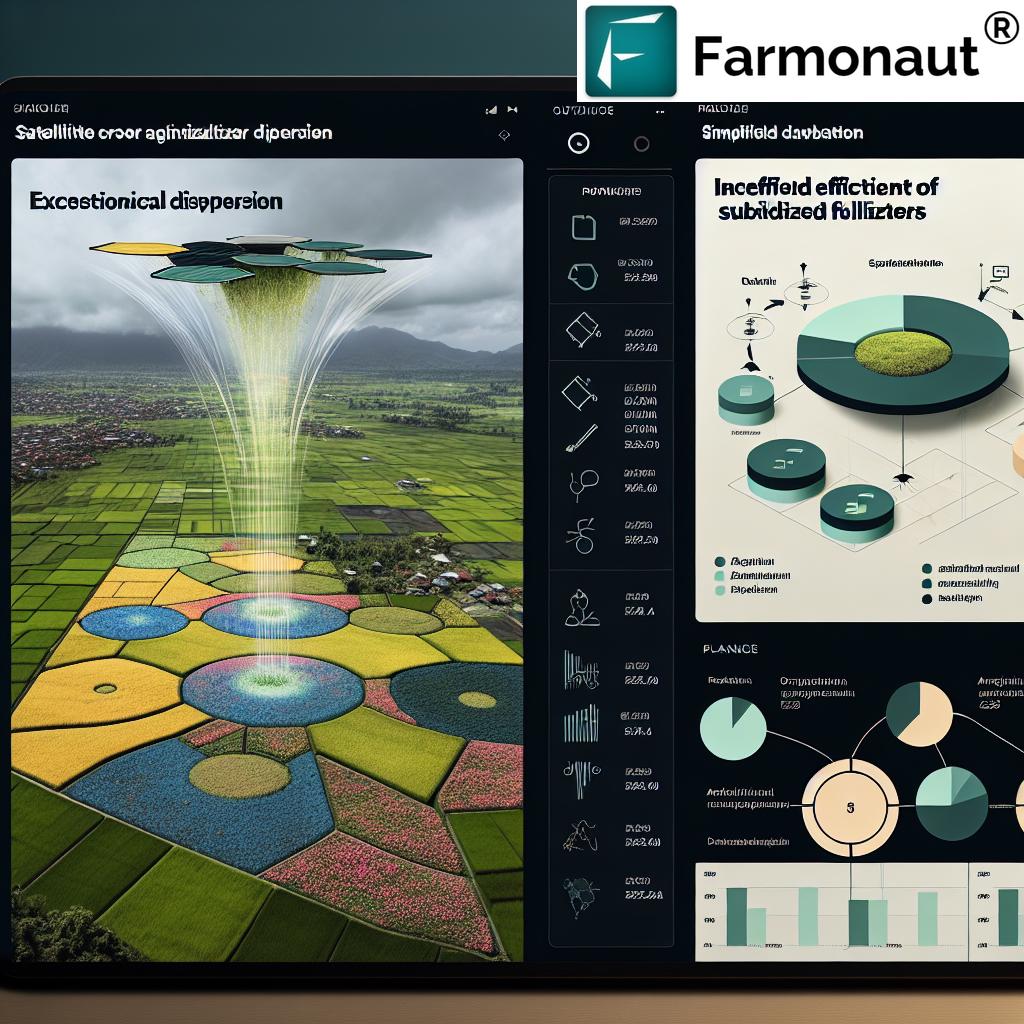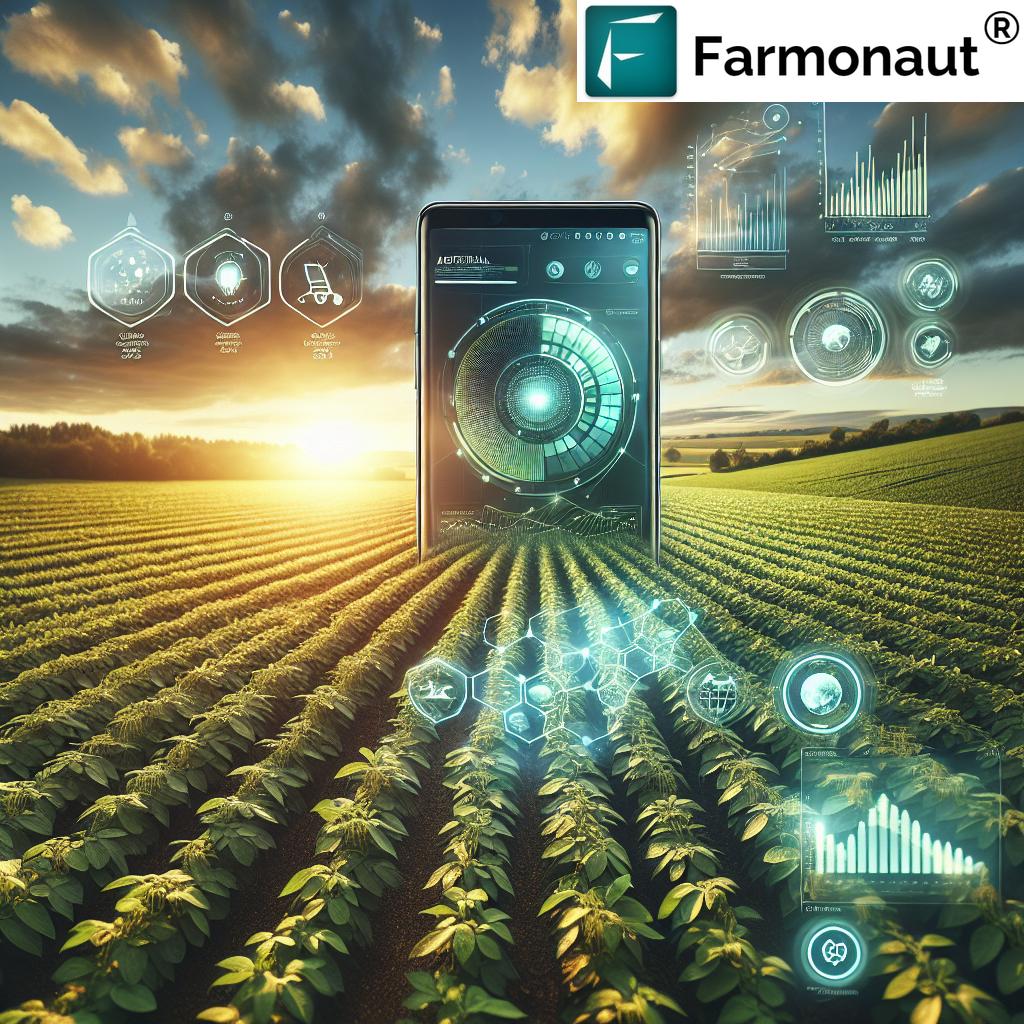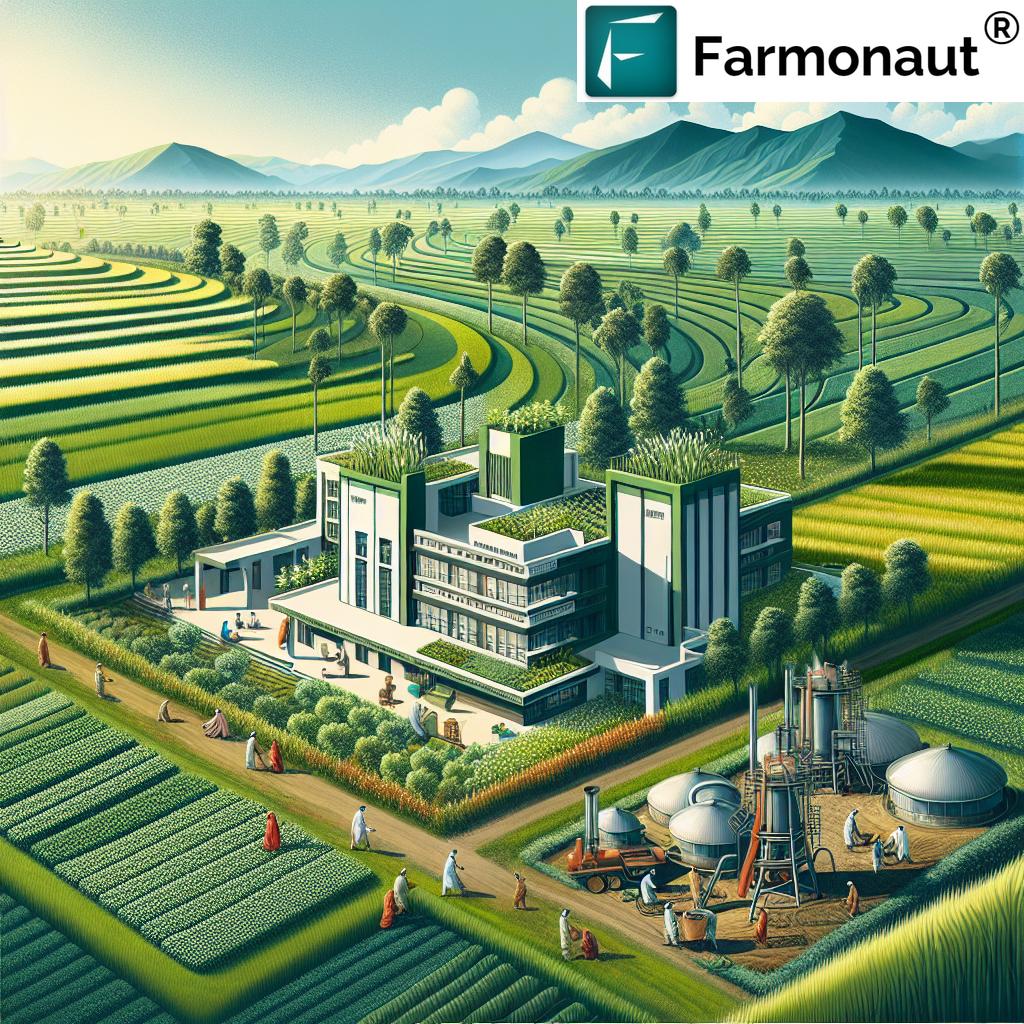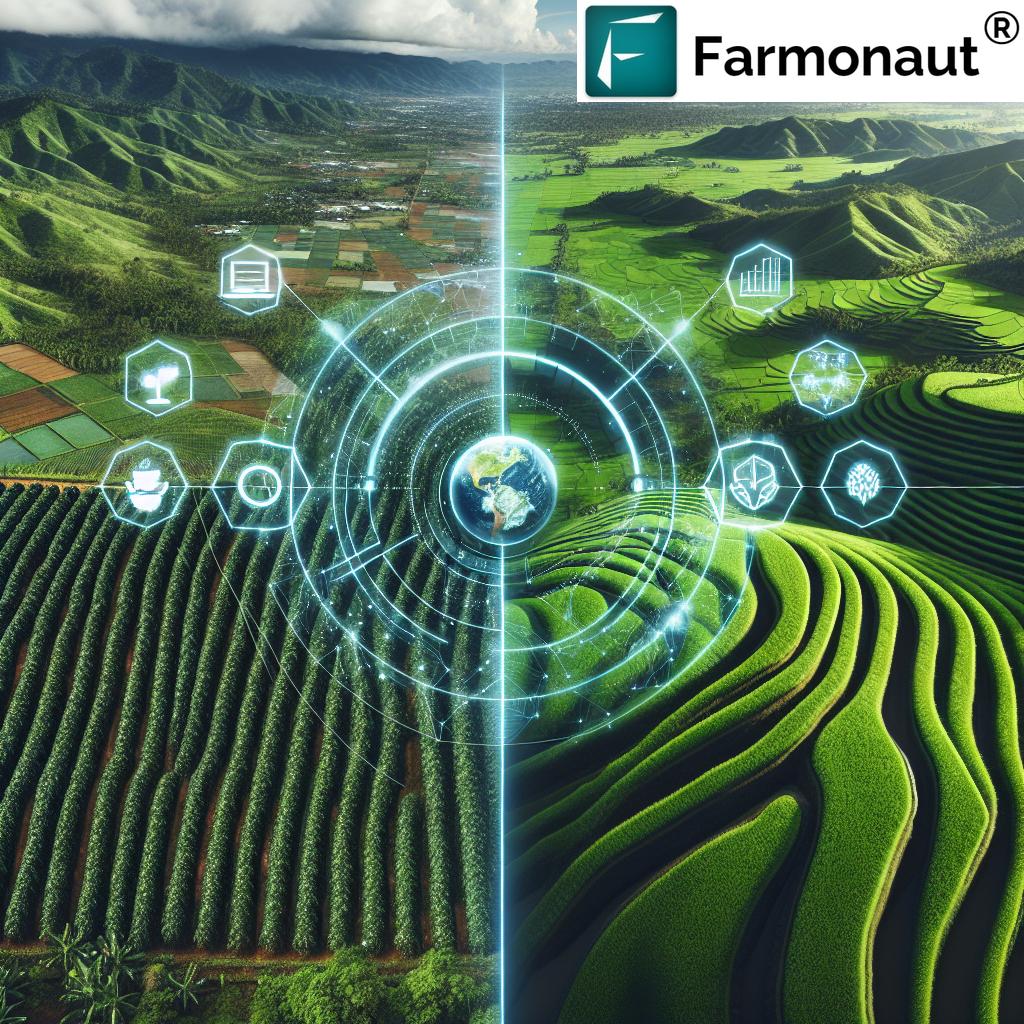Revolutionizing Indian Agriculture: How AI and Satellite Technology Drive Sustainable Farming Practices
“Satellite imagery in agriculture can detect crop stress up to 2 weeks before it’s visible to the human eye.”
In the heart of India’s agricultural landscape, a revolution is unfolding. As we at Farmonaut witness the transformation of traditional farming practices through the lens of cutting-edge technology, we’re excited to share how artificial intelligence (AI) and satellite technology are reshaping the future of sustainable agriculture in our nation. This blog post delves into the innovative world of agritech, exploring how digital solutions are empowering farmers, optimizing crop yields, and promoting climate-resilient farming practices.
The Dawn of Precision Agriculture in India
India, with its vast agricultural sector, stands at the cusp of a technological revolution. The integration of AI in agriculture and precision agriculture technology is not just a trend but a necessity to address the challenges faced by our farmers. From water scarcity to climate change, the obstacles are numerous, but so are the solutions that agritech innovation brings to the table.
At Farmonaut, we’re proud to be at the forefront of this transformation, offering satellite-based farm management solutions that make precision agriculture accessible and affordable to farmers across India. Our platform leverages advanced technologies to provide real-time insights, enabling farmers to make data-driven decisions that optimize their crop yield while promoting sustainable farming practices.
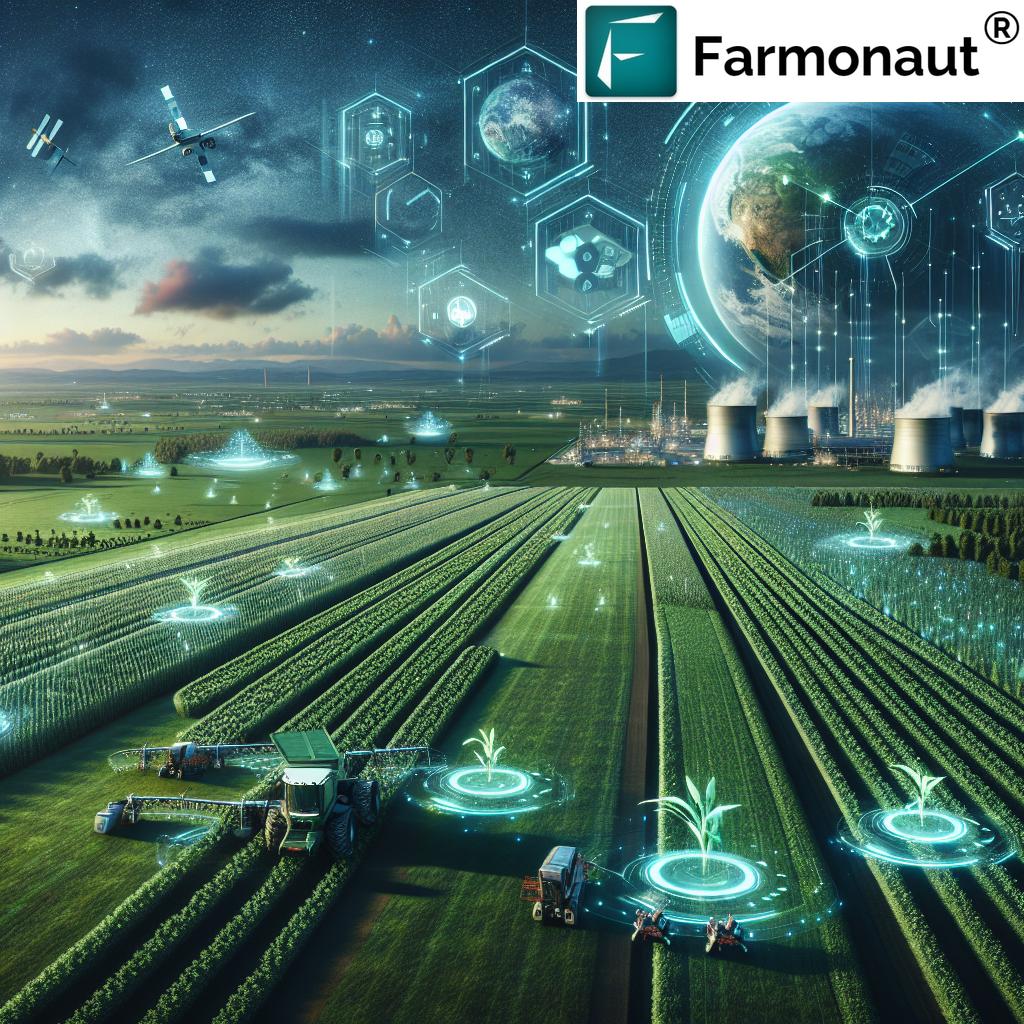
Harnessing the Power of Satellite Imagery for Farming
One of the cornerstones of our approach is the use of satellite imagery for farming. This technology allows us to monitor vast agricultural areas with unprecedented precision. Here’s how it’s changing the game:
- Crop Health Monitoring: Our satellite-based crop health monitoring system provides farmers with vital information on vegetation health (NDVI) and soil moisture levels.
- Resource Optimization: By analyzing multispectral images, we help farmers make informed decisions about irrigation, fertilizer usage, and pest management.
- Early Detection: Satellite imagery can identify potential issues weeks before they become visible to the naked eye, allowing for proactive management.
This level of insight was once the preserve of large agribusinesses, but through Farmonaut’s platform, we’re democratizing access to these powerful tools, making them available to smallholder farmers across India.
AI: The Brain Behind Smart Farm Management
Artificial intelligence is the engine driving many of our most innovative solutions. Our Jeevn AI Advisory System is a prime example of how AI in agriculture is revolutionizing farm management:
- Personalized Recommendations: By analyzing satellite data, weather patterns, and historical information, Jeevn AI provides tailored advice to each farmer.
- Predictive Analytics: AI algorithms help predict potential crop diseases, pest infestations, and optimal harvesting times.
- Continuous Learning: The system continuously improves its recommendations by learning from new data and outcomes.
This AI-driven approach to agriculture is not just about increasing productivity; it’s about creating a more resilient and sustainable farming ecosystem.
Blockchain: Ensuring Transparency in the Agricultural Supply Chain
Traceability in the agricultural supply chain is becoming increasingly important, both for consumer trust and regulatory compliance. Our blockchain-based traceability solutions address this need head-on:
- End-to-End Tracking: From seed to shelf, every step of a product’s journey can be recorded and verified.
- Fraud Prevention: Blockchain technology ensures that the data recorded is tamper-proof, reducing the risk of fraud in the supply chain.
- Consumer Confidence: Consumers can access detailed information about the origin and journey of their food, promoting trust and transparency.
By implementing blockchain technology, we’re not just improving supply chain efficiency; we’re fostering a new level of trust between farmers, distributors, and consumers.
The Impact of Digital Farming Solutions on Crop Yield
The adoption of digital farming solutions has led to significant improvements in crop yield across India. Here’s how our technology is making a difference:
- Precision Irrigation: By providing accurate soil moisture data, we help farmers optimize their water usage, leading to better yields and water conservation.
- Targeted Fertilization: Our AI-driven recommendations ensure that fertilizers are applied precisely where and when they’re needed, reducing waste and improving crop health.
- Pest Management: Early detection of pest infestations allows for timely and targeted interventions, minimizing crop damage and reducing the need for pesticides.
These improvements not only boost productivity but also contribute to more sustainable and environmentally friendly farming practices.
“AI-powered precision agriculture can reduce water usage in farming by up to 30% compared to traditional methods.”
Empowering Smallholder Farmers Through Technology
At Farmonaut, we believe that technology should benefit all farmers, regardless of the size of their operations. Our platform is designed to be accessible and user-friendly, ensuring that even smallholder farmers can leverage the power of AI and satellite technology:
- Mobile Accessibility: Our solutions are available through mobile apps, making them accessible to farmers in remote areas.
- Affordable Pricing: We offer flexible pricing tiers to ensure that our technology is within reach for farmers of all scales.
- Training and Support: We provide comprehensive training and ongoing support to help farmers make the most of our digital tools.
By democratizing access to advanced agricultural technology, we’re helping to level the playing field and improve the livelihoods of millions of smallholder farmers across India.
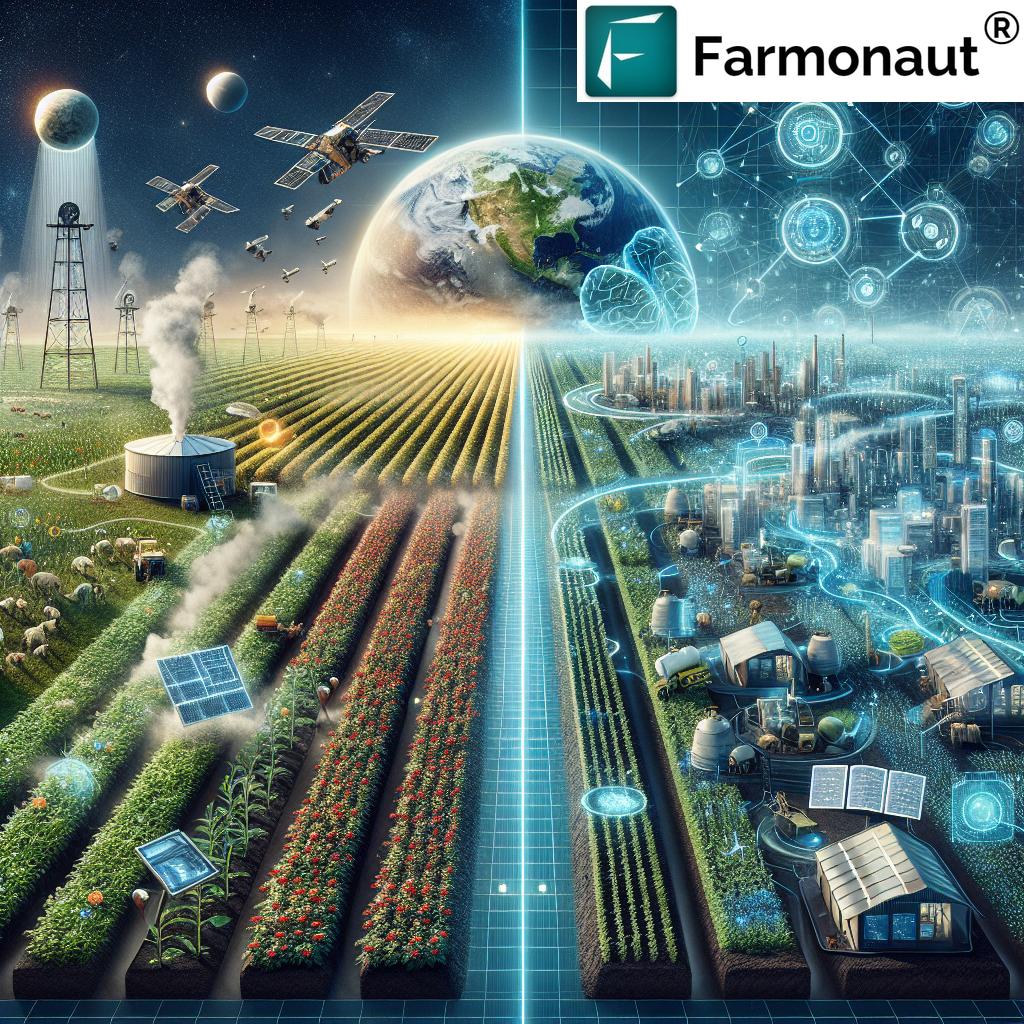
Climate-Resilient Agriculture: Adapting to Environmental Challenges
Climate change poses significant challenges to agriculture, but with the right technology, we can build resilience into our farming systems. Here’s how our platform contributes to climate-resilient agriculture:
- Weather Forecasting: Our AI systems provide accurate, localized weather forecasts, helping farmers plan their activities and mitigate weather-related risks.
- Crop Selection: Based on climate data and soil analysis, we recommend crop varieties that are best suited to local conditions and more resistant to climate stressors.
- Resource Efficiency: By optimizing resource use, we help reduce the environmental footprint of farming operations, contributing to overall climate resilience.
Through these approaches, we’re not just helping farmers adapt to climate change; we’re actively working to mitigate its effects on agriculture.
The Role of IoT in Smart Farm Management
The Internet of Things (IoT) is another crucial component of the agritech revolution. At Farmonaut, we integrate IoT devices with our satellite and AI technologies to create comprehensive smart farm management systems:
- Sensor Networks: IoT sensors deployed across farms provide real-time data on soil conditions, temperature, and humidity.
- Automated Systems: IoT-enabled irrigation systems and farm equipment can be controlled remotely, improving efficiency and reducing labor costs.
- Data Integration: Information from IoT devices is seamlessly integrated with our satellite and AI systems, providing a holistic view of farm operations.
This interconnected approach to farm management allows for unprecedented levels of control and optimization, driving both productivity and sustainability.
Overcoming Challenges in Water Management and Soil Health
Two of the most critical aspects of sustainable agriculture are water management and soil health. Our technology addresses these challenges head-on:
Water Management
- Precision Irrigation: By analyzing satellite imagery and soil moisture data, we help farmers apply water precisely where and when it’s needed.
- Water Conservation: Our AI systems help identify water-saving opportunities, such as optimal irrigation schedules and drought-resistant crop varieties.
- Runoff Prevention: By providing detailed terrain analysis, we help farmers implement strategies to reduce water runoff and soil erosion.
Soil Health
- Nutrient Management: Our platform provides detailed soil nutrient maps, enabling targeted fertilization and reducing over-application of chemicals.
- Soil Structure Analysis: Satellite imagery helps identify areas of soil compaction or erosion, allowing for targeted remediation efforts.
- Organic Matter Monitoring: We track changes in soil organic matter over time, helping farmers implement practices that improve soil health and carbon sequestration.
By addressing these fundamental aspects of agriculture, we’re helping to create more sustainable and resilient farming systems across India.
The Future of Food Production: Trends in Agricultural Technology
As we look to the future, several exciting trends in agricultural technology are emerging. At Farmonaut, we’re closely monitoring and contributing to these developments:
- Vertical Farming: AI-controlled indoor farming systems that maximize space and resource efficiency in urban areas.
- Gene Editing: Precision breeding techniques that can create more resilient and nutritious crop varieties.
- Robotics: Autonomous farm equipment that can perform tasks with minimal human intervention, increasing efficiency and reducing labor costs.
- Nanotechnology: Nano-sensors and smart materials that can enhance crop protection and nutrient delivery.
These emerging technologies hold the promise of further revolutionizing agriculture, making it more productive, sustainable, and resilient in the face of global challenges.
Enhancing Traceability in the Agricultural Supply Chain
Traceability is becoming increasingly important in the agricultural sector, driven by consumer demand for transparency and regulatory requirements. Our blockchain-based traceability solutions are at the forefront of this trend:
- QR Code Tracking: Each product can be assigned a unique QR code that consumers can scan to access its entire history.
- Real-Time Updates: Our system allows for real-time tracking of products as they move through the supply chain.
- Integration with IoT: By integrating with IoT sensors, we can provide detailed information on storage conditions and transportation.
This level of traceability not only builds consumer trust but also helps in quickly identifying and addressing any issues in the supply chain.
The Role of Agricultural Data Science in Modern Farming
Agricultural data science is the backbone of many of our innovations at Farmonaut. By leveraging big data and advanced analytics, we’re able to provide insights that were previously unimaginable:
- Yield Prediction: Our AI models can predict crop yields with remarkable accuracy, helping farmers and policymakers plan for the future.
- Risk Assessment: By analyzing historical data and current conditions, we can assess and mitigate various risks, from pest outbreaks to market fluctuations.
- Resource Allocation: Data-driven insights help optimize the allocation of resources like water, fertilizers, and labor across farming operations.
The power of agricultural data science lies in its ability to turn vast amounts of information into actionable insights, driving both productivity and sustainability in farming.
Promoting Regenerative Agriculture Through Technology
Regenerative agriculture, which focuses on improving soil health and biodiversity, is gaining traction as a sustainable farming approach. Our technology supports this movement in several ways:
- Soil Carbon Monitoring: We use satellite imagery and AI to track changes in soil organic carbon, helping farmers implement practices that sequester more carbon.
- Biodiversity Mapping: Our platform can identify areas of high biodiversity on farms, helping to protect and enhance these vital ecosystems.
- Crop Rotation Planning: AI-driven recommendations for crop rotations that improve soil health and reduce pest pressures.
By integrating these features into our platform, we’re helping farmers transition to more sustainable and regenerative practices, benefiting both their operations and the environment.
The Impact of Agritech on Global Food Security
As the global population continues to grow, ensuring food security becomes increasingly crucial. Agritech innovations play a vital role in addressing this challenge:
- Increased Productivity: By optimizing farming practices, we help increase crop yields without expanding agricultural land.
- Reduced Food Waste: Better forecasting and supply chain management help reduce post-harvest losses and food waste.
- Climate Resilience: Our technologies help farmers adapt to changing climate conditions, ensuring more stable food production.
Through these contributions, agritech is not just transforming individual farms; it’s playing a crucial role in ensuring global food security for future generations.
The Economic Impact of Digital Transformation in Agriculture
The digital transformation of agriculture is not just a technological shift; it’s an economic revolution. Here’s how it’s impacting the agricultural economy:
- Increased Profitability: By optimizing inputs and improving yields, farmers can significantly increase their profit margins.
- New Revenue Streams: Data-driven insights can open up new markets and opportunities for farmers, such as premium pricing for traceable products.
- Job Creation: The agritech sector is creating new jobs in areas like data analysis, software development, and precision agriculture consulting.
This economic transformation is helping to revitalize rural economies and make agriculture a more attractive sector for young professionals.
Farmonaut’s Contribution to Sustainable Agriculture in India
At Farmonaut, we’re proud to be at the forefront of this agricultural revolution in India. Our platform integrates many of the technologies discussed in this blog, from satellite imagery and AI to blockchain and IoT, to provide a comprehensive solution for farmers:
- Accessibility: We offer our solutions through web and mobile apps, making them accessible to farmers across India.
- Affordability: Our flexible pricing model ensures that farmers of all scales can benefit from our technology.
- Integration: We provide APIs that allow other agritech companies and researchers to integrate our data into their systems, fostering collaboration and innovation.
By making these advanced technologies accessible and affordable, we’re helping to drive the widespread adoption of sustainable farming practices across India.
To experience the power of our platform firsthand, we invite you to try our services:
For developers interested in integrating our technology into their own solutions, we offer comprehensive API documentation.
Comparison: Traditional vs. AI and Satellite-Enabled Farming
| Farming Aspect | Traditional Methods | AI and Satellite-Enabled Approach | Estimated Improvement |
|---|---|---|---|
| Water Management | Fixed irrigation schedules | Precision irrigation based on real-time soil moisture data | 30% reduction in water usage |
| Soil Health | Periodic manual soil testing | Continuous monitoring via satellite imagery and IoT sensors | 20% increase in soil organic matter |
| Crop Protection | Scheduled pesticide application | Early detection and targeted treatment of pest infestations | 40% reduction in pesticide use |
| Yield Optimization | Based on historical averages | AI-driven predictions and recommendations | 15-25% increase in crop yields |
| Resource Efficiency | Uniform application of inputs | Variable rate application based on field variability | 25% reduction in overall input costs |
Conclusion: The Future of Sustainable Agriculture in India
As we look to the future, the potential for AI and satellite technology to transform Indian agriculture is immense. By embracing these innovations, we can create a more productive, sustainable, and resilient agricultural sector that benefits farmers, consumers, and the environment alike.
At Farmonaut, we’re committed to driving this transformation, making advanced agricultural technologies accessible to farmers across India. Together, we can build a future where sustainable farming practices are the norm, ensuring food security and prosperity for generations to come.
Join us in revolutionizing Indian agriculture. Explore our solutions and be part of the agritech revolution today.
Frequently Asked Questions (FAQs)
- What is precision agriculture?
Precision agriculture is a farming management concept that uses technology to observe, measure, and respond to variability in crops. It aims to optimize returns on inputs while preserving resources. - How does satellite imagery benefit farmers?
Satellite imagery provides farmers with a bird’s-eye view of their fields, allowing them to monitor crop health, detect issues early, and make informed decisions about irrigation, fertilization, and pest control. - Can small-scale farmers benefit from agritech solutions?
Absolutely! Many agritech solutions, including Farmonaut’s platform, are designed to be accessible and affordable for farmers of all scales, including smallholders. - How does AI improve crop yield?
AI analyzes vast amounts of data to provide personalized recommendations on planting times, crop selection, and resource management, leading to optimized yields. - What is blockchain’s role in agriculture?
Blockchain technology ensures transparency and traceability in the agricultural supply chain, from farm to consumer, building trust and reducing fraud. - How does agritech contribute to sustainability?
Agritech promotes sustainability by optimizing resource use, reducing chemical inputs, and helping farmers adapt to climate change, all while improving productivity. - What is the future of farming in India?
The future of farming in India is likely to be increasingly technology-driven, with a focus on sustainable practices, precision agriculture, and data-driven decision-making.
We hope this blog post has provided valuable insights into how AI and satellite technology are revolutionizing Indian agriculture. As we continue to innovate and develop new solutions, we remain committed to our mission of making sustainable farming practices accessible to all. Together, we can create a more resilient and prosperous agricultural sector for India.






